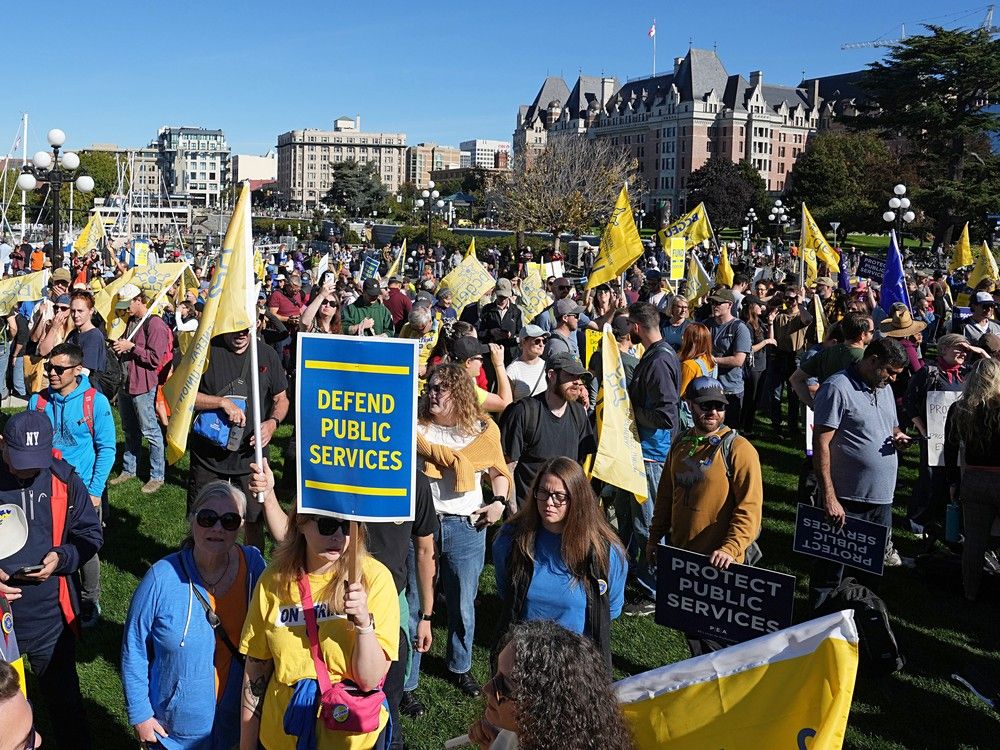
On the first day of the fall legislative session in Victoria on Monday, the NDP government introduced two bills they said would help support victims of sexualized violence and the non-consensual sharing of intimate images but were overshadowed by thousands of public service workers rallying at the legislature seeking higher wages.
The fist bill was introduced by Attorney General Niki Sharma and makes amendments to the Intimate Images Protection Act, which was introduced in 2023 and provides tools for victims to get their intimate images that were posted online non-consensually taken down from the internet.
Sharma said the amendments would increase the damages that victims can be rewarded through a Civil Resolution Tribunal decision from $5,000 to as high as $75,000. Those damages can be recouped from the perpetrator, social-media company or website.
“Because of the stigma associated with creating and sharing intimate images, people who have their images shared without their express consent suffer in silence. They are left feeling guilty, ashamed and embarrassed, believing it’s their fault,” she said at a news conference announcing the legislation.
“Even though they have been victims of abuse, they may choose not to pursue legal action, which can be restrictive, complex and expensive, and traumatizing. As a result, perpetrators of such horrible violations of privacy face no consequences. We are correcting that.”
The second piece of legislation introduced Monday, a new Sexual Violence Policy Act, was put forward by Post-Secondary Education Minister Jessie Sunner and would increase the policy scope of the previous legislation by not just covering students but also all faculty, employees, volunteers and board members of post-secondary institutions.
At the same time as Sharma and Sunner were announcing these bills, thousands of members of the B.C. General Employees Union were rallying outside the legislature for a higher wage increase than the five per cent over two years that the NDP offered last week.
Filling the air were chants that ranged from calling Finance Minister Brenda Bailey to resign to saying that the union gets stronger every day it’s on strike.

BCGEU president Paul Finch told reporters that 10,000 people showed up to the rally, including unionized employees not just from his union, but also from the B.C. Nurses’ Union, B.C. Ferry and Marine Workers Union, the Professional Employees Association, and the Canadian Union of Public Employees.
Finch said there is no indication that the two sides will get back to the bargaining table any time soon and that 22,000 of the union’s 34,000 public service members are now engaged in job action.
Roughly 900 members of the Professional Employees Association are also on strike, with executive director Melissa Moroz telling rallygoers that the offers from the employer so far only serve to take the union backwards.
“We’re going to keep escalating until they do get the message. Especially here in Victoria, a lot of these people are the base for government. They’re the voting base for government. You go and walk a picket line with people, and you can see the disappointment with the decisions this government’s making,” said Finch.
“I think the breaking point is going to come when government gets in touch with where people are at. Look, we’ve seen this isn’t the first time that we’ve seen this government lag behind the popular will, behind public opinion.”
Bailey told reporters that the government feels their latest offer was reasonable and would keep workers’ wages in line with the rate of inflation.
She said she could hear the workers from her office and that they’re allowed to chant whatever they want, including calls for her resignation.
“I’ve heard this chant a lot in the past while, and again, respect the rights of workers to chant whatever they need to chant, and to take the action that they need to take,” said Bailey.
“But the reality is, we must find an agreement that is not only fair to these workers, but is fair to all British Columbians, and that’s the work ahead of us.”